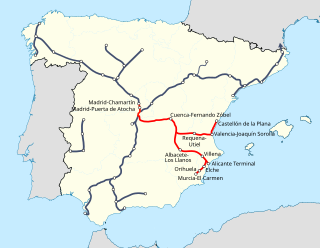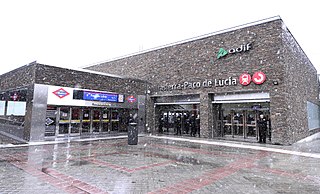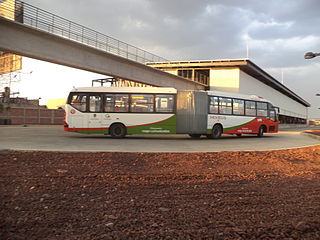
Santiago, also known as Santiago de Chile, is the capital and largest city of Chile and one of the largest cities in the Americas. It is located in the country's central valley and is the center of the Santiago Metropolitan Region, which has a population of seven million, representing 40% of Chile's total population. Most of the city is situated between 500–650 m (1,640–2,133 ft) above sea level.

Valparaíso is a major city, commune, seaport and naval base facility in Valparaíso Region, Chile.

The Madrid Metro is a rapid transit system serving the city of Madrid, capital of Spain. The system is the 14th longest rapid transit system in the world, with a total length of 293 km (182 mi). Its growth between 1995 and 2007 put it among the fastest-growing networks in the world at the time. However, the European debt crisis greatly slowed expansion plans, with many projects being postponed and canceled. Unlike normal Spanish road and rail traffic, which drive on the right, Madrid Metro trains use left-hand running on all lines because traffic in Madrid drove on the left until 1924, five years after the system started operating.

Medellín, officially the Special District of Science, Technology and Innovation of Medellín, is the second-largest city in Colombia after Bogotá, and the capital of the department of Antioquia. It is located in the Aburrá Valley, a central region of the Andes Mountains, in northwestern South America. The city's population was 2,508,452 at the 2018 census. The metro area of Medellín is the second-largest urban agglomeration in Colombia in terms of population and economy, with more than 4 million people.

The Santiago Metro is a rapid transit system serving the city of Santiago, the capital of Chile. It currently consists of seven lines, 143 stations, and 149 kilometres (92.6 mi) of revenue route. The system is managed by the state-owned Metro S.A. and is the first and only rapid transit system in the country.

Empresa de los Ferrocarriles del Estado is the national railway and the oldest state-run enterprise in Chile. It manages the infrastructure and operating rail services in the country.

Metrovalencia is an urban rail including rapid transit and trams, serving Valencia and its metropolitan area. The network is a modern amalgamation of former FEVE narrow gauge electric-operated suburban railways. It is a large suburban network that crosses the city of Valencia, with all trains continuing out to the suburbs. It also has destinations on lines that make it more closely resemble commuter trains. The unique system combines light railway, metro and several tram operations north of the Túria riverbed park with line 4. Trains of lines 1, 3, 5 and 9 have automatic train operation (ATO) in 25.3 kilometers of underground system. Tram lines 4, 6, 8 and 10 are operated by modern trams.
Telemadrid is a public television station in the Community of Madrid, Spain, the flagship channel of the regional public broadcaster Radio Televisión Madrid (RTVM). It began its broadcast on 2 May 1989.

The Valparaíso Metro is the commuter rail system serving the urban conglomeration of Gran Valparaíso, Chile. It consists of one line, 43 kilometres (27 mi) long, serving 20 stations, connecting the cities of Valparaíso, Viña del Mar, Quilpué, Villa Alemana, and Limache.

The Madrid–Levante high-speed network is a network of high-speed rail lines that connects Madrid with the Mediterranean coast of the Levante Region, specifically with Castilla-La Mancha, the Valencian Community and the Murcia Region autonomous communities.

The 2010 Pichilemu earthquakes, also known as the Libertador O'Higgins earthquakes, were a pair of intraplate earthquakes measuring 6.9 and 7.0 that struck Chile's O'Higgins Region on 11 March 2010 about 16 minutes apart. The earthquakes were centred 15 kilometres (9.3 mi) northwest of the city of Pichilemu.

Memoria Chilena is a Chilean cultural website which, according to its own words, "offers investigations and documents related to key topics which make up the Chilean identity, accessible through the areas of history, literature, social sciences, music, and visual arts." Memoria Chilena is, also, a virtual library, which preserves material from the Biblioteca Nacional de Chile and other institutions from the Dirección de Bibliotecas, Archivos y Museos (DIBAM).

The Empresa Municipal de Transportes de Madrid is the company charged with the planning of public urban transport in the city in Madrid, Spain. The organization is wholly owned by the City Council of Madrid and is a member of the Consorcio Regional de Transportes de Madrid. Among the services provided by EMT Madrid are urban bus transportation as well as the BiciMAD bicycle-sharing system.

Olivos metro station is a station of the Mexico City Metro in the colonias (neighborhoods) of Ampliación Los Olivos and Granjas San Jerónimo, in Tláhuac, Mexico City. It is an elevated station with two side platforms, served by Line 12, between Tezonco and Nopalera stations. The station's pictogram features an olive branch, as it references the area's reputation for olive oil production during the Colonial period. The station was opened on 30 October 2012, on the first day of service between Tláhuac and Mixcoac metro stations.

Paco de Lucía station completes extension of Line 9 of the Madrid Metro. It is located in fare Zone A and brings Metro to 50.000 new potential users. It opened on 25 March 2015, at the time making it station 301 of the Metro Madrid network. While the station's name was originally supposed to be Costa Brava, it is now named after Spanish musician and guitarist Paco de Lucía (1947–2014), a former resident of the district the station is located in, who died in 2014.

Cabify is a transportation platform for people and objects. The company operates in Spain and Hispanic America. Between 2016 and 2019, it also operated in Portugal and between 2016 and 2021 in Brazil.

The Sistema de Transporte Público Cablebús, simply branded as Cablebús, is an aerial lift transport system that runs in the Gustavo A. Madero and Iztapalapa areas of Mexico City. It is operated by Servicio de Transportes Eléctricos, the agency responsible for the operation of all trolleybus and light rail services in Mexico City. Line 1 was officially inaugurated on 11 July 2021, going from the Indios Verdes station of the STC Metro to the northern neighborhoods of Gustavo A. Madero. Line 2 runs from the Constitución de 1917 to the Santa Marta STC Metro stations in the southeast of the city.

Radio Televisión Madrid S.A. (RTVM) is the public broadcaster of the Community of Madrid.

Lucía Abello is a Chilean librarian, naturalist and botanist. She has been in charge of exploring, researching, documenting and disseminating the native flora in her region and in her country, as well as its traditional uses through photography and bibliographic publications. She has also been in charge of promoting reading from the public library with a respect for the environment approach.

The Mexibús Line II is a bus rapid transit (BRT) line in the Mexibús system. It operates between La Quebrada in Cuautitlán Izcalli and Las Américas in Ecatepec de Morelos. It was the second line to be built and the third to be opened. It was inaugurated by the governor of the State of Mexico, Eruviel Ávila on 12 January 2015 with 43 stations. It is 21.3 kilometers (13.2 mi) long. The line has two different types of services, and both include a service exclusively for women and children named Servicio Rosa. The line operates with 97 buses. On 8 October 2018, the Servicio Exprés was opened, going from Lechería to Ecatepec stations.























